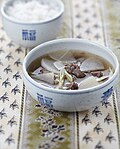Korean radish
Korean Radish (Raphanus sativus) is a type of radish native to Korea. It is a key ingredient in many traditional Korean dishes, including kimchi and muguk.
Description
The Korean radish is a variety of white radish and has a firm crunchy texture. It is typically characterized by fast growth, high yield, and strong resistance to diseases and pests. The radish is green near the stem and fades to white at the tip. It has a slightly sweet and peppery taste.
Cultivation
Korean radish is a cool season crop and is best grown in spring and fall. It prefers full sun and well-drained, fertile soil. The seeds are sown directly into the ground and germinate within a few days. The radishes are usually ready to harvest within 6-7 weeks after planting.
Culinary Uses
In Korean cuisine, the radish is used in a variety of dishes. It is often pickled to make kkakdugi, a type of kimchi. It is also used in soups and stews, such as muguk and seolleongtang. The leaves of the radish are also edible and can be used in salads or as a garnish.
Health Benefits
Korean radish is rich in Vitamin C, potassium, and antioxidants. It is also a good source of dietary fiber. Regular consumption of Korean radish can aid in digestion, boost the immune system, and promote heart health.
See Also
- Chikinmu (pickled radish).jpg
Korean_radish
Transform your life with W8MD's budget GLP-1 injections from $125.
W8MD offers a medical weight loss program to lose weight in Philadelphia. Our physician-supervised medical weight loss provides:
- Most insurances accepted or discounted self-pay rates. We will obtain insurance prior authorizations if needed.
- Generic GLP1 weight loss injections from $125 for the starting dose.
- Also offer prescription weight loss medications including Phentermine, Qsymia, Diethylpropion, Contrave etc.
NYC weight loss doctor appointments
Start your NYC weight loss journey today at our NYC medical weight loss and Philadelphia medical weight loss clinics.
- Call 718-946-5500 to lose weight in NYC or for medical weight loss in Philadelphia 215-676-2334.
- Tags:NYC medical weight loss, Philadelphia lose weight Zepbound NYC, Budget GLP1 weight loss injections, Wegovy Philadelphia, Wegovy NYC, Philadelphia medical weight loss, Brookly weight loss and Wegovy NYC
|
WikiMD's Wellness Encyclopedia |
| Let Food Be Thy Medicine Medicine Thy Food - Hippocrates |
Medical Disclaimer: WikiMD is not a substitute for professional medical advice. The information on WikiMD is provided as an information resource only, may be incorrect, outdated or misleading, and is not to be used or relied on for any diagnostic or treatment purposes. Please consult your health care provider before making any healthcare decisions or for guidance about a specific medical condition. WikiMD expressly disclaims responsibility, and shall have no liability, for any damages, loss, injury, or liability whatsoever suffered as a result of your reliance on the information contained in this site. By visiting this site you agree to the foregoing terms and conditions, which may from time to time be changed or supplemented by WikiMD. If you do not agree to the foregoing terms and conditions, you should not enter or use this site. See full disclaimer.
Credits:Most images are courtesy of Wikimedia commons, and templates, categories Wikipedia, licensed under CC BY SA or similar.
Contributors: Prab R. Tumpati, MD











